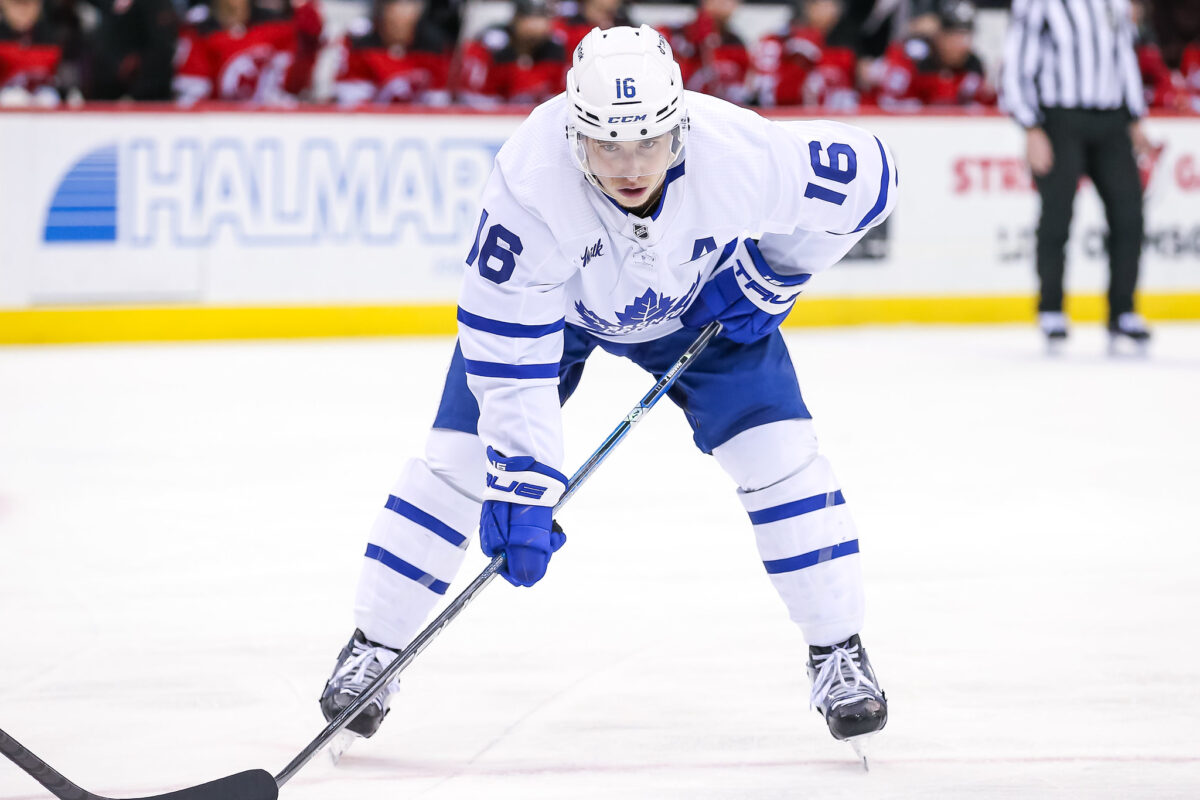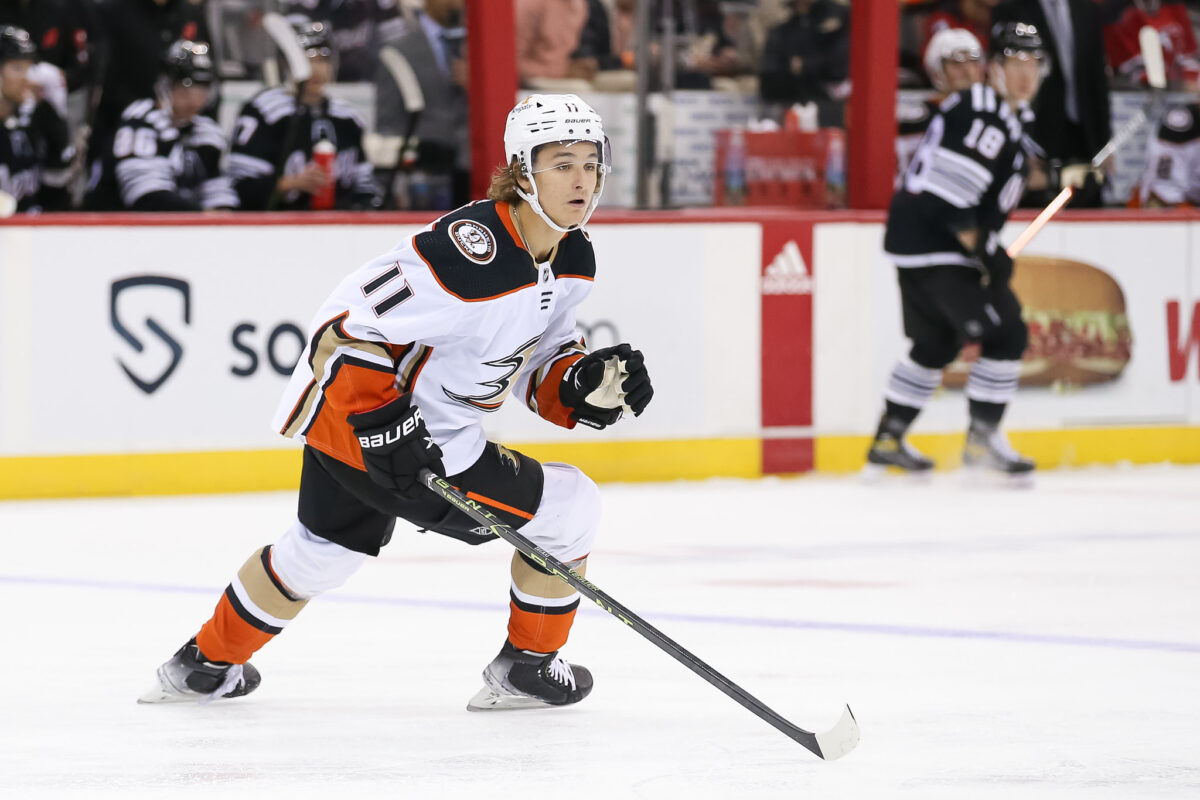The general consensus is the Montreal Canadiens will or at least should be looking to acquire a top-six forward this 2024 offseason. Whether or not that sentiment’s accurate, there isn’t as much consensus as to whom they should target, with so many arguable star-calibre forwards available.
So, hypothetically speaking, were general manager Kent Hughes on the verge of making a big offseason splash for the third consecutive summer, which player would he most realistically acquire? Here are the top candidates, among the names in the rumour mill, ranked in increasing order of likelihood (even if an actual trade is inherently unlikely):
4. Mitch Marner (Toronto Maple Leafs)
By far, Toronto Maple Leafs forward Mitch Marner is the most prolific name on this list, in terms of his level of production. He’s over a point-per-game player in his career, having just scored 26 goals and 59 points in 69 games this past season. His best campaign was in 2021-22, during which he scored a career-high 35 goals to go along with 62 assists (72 games).

So, it’s no exaggeration to say, were the Canadiens to pony up to acquire him, somehow, someway, he would objectively become their most potent all-around offensive weapon. The key term in that past sentence is “pony up,” though. Not only would Hughes have to navigate the delicate, non-conducive-to-trades relationship the two teams have as division and historic rivals. He’d have to (over)pay top dollar as a result. On top of that, he’d have to pay him his $8.025 million salary in 2024-25.
That number is significant, on top of Marner’s $10.903 million cap hit. Nick Suzuki’s cap hit is $7.875 million. On the surface at least, considering Cole Caufield re-signed 1.5 years later at a cap hit of $7.85 million, it looks like Hughes has made an effort to keep Suzuki at the top of the team’s pay structure.
Granted, Suzuki’s actual upcoming salary is $10 million. So, there technically isn’t a conflict, especially seeing as Marner’s contract expires after next season. However, that’s in part the problem. Is Hughes really going to pay that aforementioned top dollar (presumably a combination of blue-chip prospects and young roster players on the rise) simply to acquire a player for one season, before he becomes an unrestricted free agent? He shouldn’t.
The Canadiens simply aren’t ready to contend. So, acquiring a player who will almost certainly move on next offseason, having lived the rivalry himself, would be a stupid decision. In fact, a la Josh Gorges a decade ago now, can anyone be absolutely sure Marner wouldn’t use his no-movement clause to block a trade to the Canadiens in the first place?
It might be worth trying for Hughes. Marner is in the prime of his career and a legitimate star. However, it ultimately wouldn’t be worth it in general, based on the one year they’d get out of Marner and the assets they’d have to give up in the process. Hughes should look elsewhere.
3. Patrik Laine (Columbus Blue Jackets)
Ignoring Patrik Laine’s time in the NHL/NHL Players’ Association Player Assistance Program, he’s a better fit relative to Marner. For starters, there isn’t the same expectation of overpayment, dealing with a non-rival like the Columbus Blue Jackets. Secondly, acquiring Laine in general would cost less considering his recent struggles, coming off a season in which he scored just six goals and three assists (18 games). Just a few seasons ago, when the Winnipeg Jets traded him to the Blue Jackets, he notched just 24 points in 46 games.
Maybe that’s unfair, because Laine is otherwise a point-per game player, good for over 30 goals over a complete season, once having scored 44 (2017-18). However, he’s not even close to being at the same level of an Auston Matthews, who went No. 1 to his No. 2 in 2016, when, heading in, there had been some speculation the Leafs could choose him instead.
Regardless, acquiring Laine is more realistic, bottom line. However, while his contract is better for the Canadiens’ purposes, it’s still not ideal. He’d still have a higher cap hit than Suzuki ($8.7 million), and, while, yes, you shouldn’t hold back on acquiring legitimate star power simply because of the salary implications, in Laine’s case there are sincere doubts he’d be worth it. Sure, he’s under contract until 2026, but throwing your entire pay structure out the window on a prayer Laine rediscovers his scoring touch, for just two years? The Canadiens won’t be ready to legitimately contend in that time. It’s that simple.
Admittedly, re-signing Laine is more of a realistic proposition than re-signing Marner would be. However, you’re talking about a player who is notoriously inconsistent, who hasn’t played 70 games in a season since 2018-19. Unless the Blue Jackets are giving him away, you don’t take that chance. Hell, even if they are, you’d have a lot of questions before signing on the dotted line. That’s again not in reference to his personal struggles, just his level of performance, perhaps as a result, perhaps not. In any case, while Laine deserves another chance, assuming he’s gotten the help he needs, it shouldn’t be with the Canadiens.
2. Trevor Zegras (Anaheim Ducks)
Anaheim Ducks forward Trevor Zegras is a forward who makes a lot more sense than either of the previous names. He’s got a $5.75 million cap hit up until 2026, at which point he becomes a restricted free agent, which is key. It should be important for the Canadiens to commit to the big picture and acquire players who project to remain under team control for the foreseeable future. However, you still have to acquire them, right?

That’s the sticky part of the situation surrounding Zegras. Even if you look past the holes in his game and focus solely on his offensive capability, which the Canadiens can obviously use, they shouldn’t sacrifice defense in any trade for him. That arguably goes double, taking his defensive deficiencies into account, actually.
Regardless, reports the Ducks would want one of Kaiden Guhle or David Reinbacher back are concerning. Even if Zegras is more established than either one of the two Canadiens defensemen cited, the Habs clearly have high hopes for both. Take Reinbacher as an example. The Canadiens specifically selected him at the 2023 NHL Entry Draft over several high-impact forwards, arguably players with more projected upside than Zegras.
So, Hughes turning around to trade Reinbacher, a defenseman in whom the Canadiens seem to see the top-pairing, right-handed defenseman they need, for Zegras, who seemed to lose ground in a not-so-deep Ducks lineup last season, playing the 15th-most amount of ice time? Why would he do that?
Now apply that logic to Guhle, who, unlike Reinbacher, has become an NHL regular. More than that, he’s earned the trust of the Canadiens, largely playing on the top pair opposite Mike Matheson. Sure, that’s Guhle’s opposite side, and it might speak to the logjam on the defense that should see someone traded eventually. However, based on Guhle’s upside, it’s fair to suggest the Habs would sooner trade Matheson to make room, no?
1. Martin Necas (Carolina Hurricanes)
Under the relatively safe assumption the Hurricanes wouldn’t want an injured Arber Xhekaj (plus) for forward Martin Necas, there are other options. For example, some analysts suggest Matheson fits the profile of the player the Canes would be looking for in exchange (from ‘Martin Necas a Montreal : serieuses, ces rumeurs?,’ La Presse, May 31, 2024).
That having been said, while it’s inherently possible the Canadiens trade Matheson, that’s not necessarily the wisest course of action. He just scored 62 points as part of one of the most successful campaigns for a Canadiens defenseman this century and is on a team-friendly deal for the next two seasons with a cap hit of just $4.875 million.
Matheson is also just 30. However, looking at it another way, he’s 30 and one of the few veterans on an exceptionally young team, with an especially young defense. Trading away his leadership would be a significant risk.
Related: Canadiens Can’t Go Scorched Earth Trading Away Veterans at Deadline
Admittedly, one or more defenseman will have to go at some point. And, while David Savard and Johnathan Kovacevic are both on expiring contracts, neither of them can fetch what Matheson would on the trade market. Maybe this is the opportunity, with Necas potentially on his way out of the Hurricanes organization as a restricted free agent.
However, Necas is a one-time 70-point player and a 25-year-old former first-round pick. He’ll want big money and justifiably so. On paper, he fits the profile of the player the Canadiens would want. In practice though, where in the lineup would he play exactly? Maybe he’s a top-line player in principle, but the Habs shouldn’t be prepared to split up the top line of Suzuki, Caufield and Juraj Slafkovsky.
Meanwhile, Kirby Dach is poised to return to centre the second line, which could realistically feature Alex Newhook and Josh Anderson. Obviously, Necas is more valuable than the latter (maybe the former). However, the Canadiens should want to salvage what’s left of Anderson’s untradeable contract by putting him in the best position to succeed. So, that could translate to a top-six role, at least to start next season.
To his credit, Newhook successfully proved himself as a centre down the stretch last season with Dach injured. The Canadiens could play him down the middle again, even with Dach healthy, but, on a team that also features Jake Evans and Christian Dvorak, there simply isn’t room, including for a new top-six forward in Necas (who coincidentally also plays centre).
It’s not a knock on Necas. He’s a valuable player and the Canadiens should be interested in acquiring him like just about every team in the league. And, if the price tag included an excess forward on the roster, it might be worth it. However, weighing what Necas would want as a salary against where he’d end up playing, it’s far from a slam dunk. There just isn’t room for him or any other top-six forward they would want to/could conceivably acquire based on the current makeup of the lineup, making addition by subtraction Hughes’ bigger priority here.
Even then though, assuming Hughes can make room, does trading away Matheson (for example) to acquire Necas make sense when the Canadiens have prospects on the rise in Joshua Roy, Emil Heineman, Owen Beck, etc.? These are prospects who are significantly cheaper who would better fit the team’s pay structure based on the roles they’d be playing. In the case of someone like Roy, he specifically could maybe replicate Necas’ production in time. So, hurting the defense here might translate to cutting off their nose to spite their face.
It all depends on the deal to be made, admittedly. However, of all the names on this list, Necas is the most worthwhile target. He’s just not the arrow in Hughes’ quiver he needs to fire first (or at all, in all honesty). Make the room first. Then make the trade, assuming there’s even one to be made. Otherwise, and this oftentimes gets lost in translation under circumstances such as these, this entire discussion is moot.
